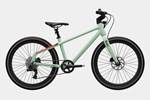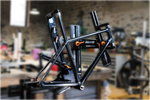Lehvoss provides evidence of extreme resilience of composites through e-bike expedition
Lehvoss’ carbon fiber-reinforced thermoplastic composite materials are being used in the production of an e-bike set that will taken an expedition across North Africa.

Photo Credit: Lehvoss
At the beginning of 2024, three riders, Mike Fuchs, Oliver Gehrking and David Arlandis, will set off on a sustained journey. The riders will travel from Germany to North Africa where they will bike approximately 1,300 kilometers through mountains, snowfields and the hot desert, showcasing that bicycle frames and components made of thermoplastic composites can withstand even the toughest demands.
The bicycle that will carry the bikers throughout this journey is the Buddy X1 e-bike from Buddy Bike and Isoco (Saalfeld, Germany)/V Frames (Schmiedefeld, Germany). Together, the partners develop high-quality composite e-bikes that stand out for design, quality, durability and environmental friendliness (read “Isoco, V Frames, Lehvoss introduce recycled, biopolymer composites to bike frames”). In central Europe, the bikes are available and for sale under the name Isoco X1.
Buddy’s frame itself is manufactured in Germany by Isoco/V Frames. Thermoplastic carbon fiber plastics from Lehvoss (Hamburg, Germany) are used for the production. The V Frames bicycle frames have a 68% lower carbon footprint than traditional aluminum. Additionally, the V Frames bicycle frames are lighter than aluminum frames and are 100% recyclable at the end of their service life. The Buddy X1 frame has passed all tests relevant to its class as the first tool-drop, injection-molded frame.
The thermoplastic bicycle frames were compared with welded aluminum frames. Aluminum, like the Lehvoss material used here, is recyclable. Composite frames are based on a mixture of thermoset resin and carbon fibers and cannot be recycled in a technically or ecologically sensible manner.
Fuchs, Gehrking and Arlandis will be on the road in a very sensitive and challenging ecosystem. On e-bikes, and with components that are all heavy-duty, they aim to prove that such a demanding expedition is also possible while consistently implementing the idea of sustainability.
Related Content
-
Plant tour: Albany Engineered Composites, Rochester, N.H., U.S.
Efficient, high-quality, well-controlled composites manufacturing at volume is the mantra for this 3D weaving specialist.
-
The state of recycled carbon fiber
As the need for carbon fiber rises, can recycling fill the gap?
-
The lessons behind OceanGate
Carbon fiber composites faced much criticism in the wake of the OceanGate submersible accident. CW’s publisher Jeff Sloan explains that it’s not that simple.















